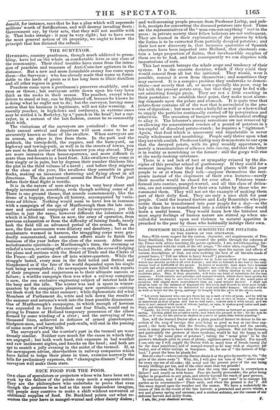THE SURVEYOR.
HITHERTO, country gentlemen, though much addicted to grum- bling, have led on the whole as comfortable lives as any class of the community. Their chief troubles have come from the intru- sion of poachers and rumours of Anti-Corn-law agitators in the distance. But a new and more formidable enemy has come upon them—the Surveyor; who has already made that name as formi- dable to the lords of grain as it has long been to illicit distillers and all other rogues in grain.
Poachers come upon a gentleman's preserves stealthily, and in twos or threes ; but surveyors settle down upon his very lawn thick as the rooks in their season. The poacher, except when driven to stand at bay, can be frightened off, because he knows he is doing what he ought not to do; but the surveyor, having some notion that his business is legitimate, will not take warning. A rascally poacher, in high-lows and corduroys, in extreme cases may be settled it la Berkeley, by a "punch in the head"; but a sur- veyor, in a surtout of the last fashion, cannot be so summarily dealt with.
The visitations of the surveyors are periodical : the time of their annual arrival and departure will soon come to be as accurately known as those of the swallow. When surveyors are in season, no place is free from them. In the park and the paddock, the turnip-field, the coppice, and the barn-yard, on highway and towing-path, as well as in the streets of towns, you are sure to flush covies of them whenever you step abroad. They are more intrusive than house-sparrows, and more difficult to scare than red-breasts in a hard frost. Like swallows they come at first singly or in pairs, but by degrees their number thickens like the plot in the third volume of a novel ; and before they migrate at the close of the year, like swallows they assemble in great flocks, making an incessant chattering and flying about in all directions. The din and turmoil around the Board of Trade just before their final flight is terrific.
It is in the nature of men always to be very busy about and deeply interested in something, even though nothing come of it. There is one ground theme, that sounds monotonously, like the drone of a bagpipe, through all history, accompanied by varia- tions ad libitum. Nothing would seem to have less in common with a campaign of the age of Marlborough than the late sum- mer and autumnal campaigns of railway-surveyors ; yet the outline is just the same, however different the substance with which it is filled up. Then as now, the army of operation, from previous exhaustion or from the difficulty of raising funds, rarely took the field till an advanced period of the season. Then as now, the first movements were dilatory and desultory ; but as the combatants warmed in harness, the straggling corps were gra- dually concentrated, and enormous efforts made to finish the business of the year before the close of the season. After some melodramatic spectiole—in Marlborough's time, the storming or relief of a town, or cutting off a convoy—in ours, the scena of lodging the plans and sections with the Board of Trade and the Clerks of the Peace—all parties drew off into winter-quarters. While the struggle lasted, every man in the field toiled and fretted and blasphemed as if the fate of the world depended upon his single task being accomplished ; the newspapers were filled with reports of their progress and conjectures as to their ultimate success or failure; a warlike campaign then was what a railway campaign is now, the one exclusive engrossing subject of interest both for the busy and the idle. The winter was and is spent in winter- quarters by the campaigners planning new operations—cutting out fresh work for the next summer ; while diplomatists did what Members of Parliament do, write and talk clown the results of the summer and autumn's work into the least possible dimensions. One of Marlborou„oth's campaigns, in which enough of heroism was expended to have furnished out four Iliads, would end in giving, to France or Holland temporary possession of the elbow formed by some winding of a river ; and the surveying of two thousand lines, achieved in defiance of armed gamekeepers, bludgeon-men, and barricaded park-walls, will end in the passing of some score of railway bills.
The surveyor's and the warrior's part in the turmoil are won- drously similar. Neither care much for the cause in which they are engaged ; but both work hard, risk exposure in bad weather and raw inclement nights, and knocks on the head ; and both are apt to snatch a jolly evening; in the midst of the turmoil. If, as the newspapers advise, shareholders in railway companies which have failed to lodge their plans in time, examine narrowly the bills for preliminary expenses, the "champagne dinners" of some surveyors will make them stare.


























 Previous page
Previous page